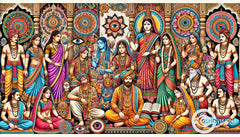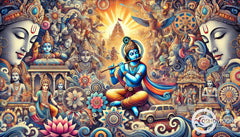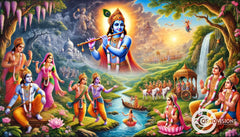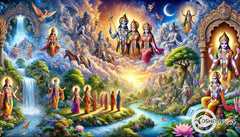The Power of Lord Krishna Mantra for Prosperity, Protection, and Joy
Posted by Massimiliano Geraci
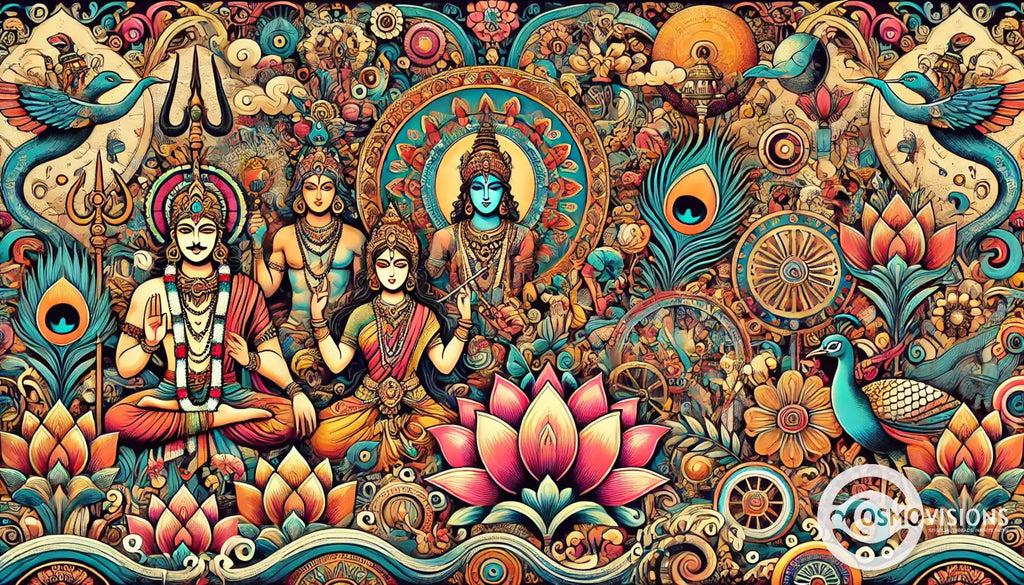
In times of uncertainty and challenge, finding sources of prosperity, protection, and joy can seem like a distant dream for many. The quest for a serene mind and a fulfilled life often leads individuals on diverse paths; yet, ancient wisdom provides timeless solutions that resonate with the modern seeker.
One such venerable solution lies in the sacred sounds of the Sri Krishna mantra. This powerful mantra stands as a beacon of hope, offering spiritual upliftment and inner peace to those who embrace its vibrations.
The origin of the Krishna mantra traces back to ancient Hindu scriptures, where it was revered as a spiritual tool for connecting with the divine consciousness. Embodying the essence of Lord Krishna's teachings, this mantra encapsulates principles of love, devotion (bhakti), and universal truth within its harmonious syllables.
As we unfold its layers through chanting, we invite an influx of divine qualities into our lives.
Our journey through this article will explore how regular recitation of Lord Krishna mantras can transform your life by attracting abundance while shielding you from negativity. We will delve into different popular mantras including Hare Krishna Maha-Mantra and Sri Krishna Gayatri Mantra among others - each carrying unique benefits that foster well-being across all facets: spiritually mentally emotionally physically.
Get ready to discover paths toward everlasting happiness profound peace .
What is the Krishna Mantra?
The Krishna Mantra emerges as a potent invocation, harmonizing the essence of divine love and spiritual liberation. Distilled from ancient scriptures, it serves as a bridge connecting devotees with Sri Krishna's eternal grace and wisdom.
Rooted in Vedic tradition, these sacred chants echo the profound relationship between the soul and the Supreme Being. By intoning "Hare Krishna Hare Krishna, Krishna Krishna Hare Hare / Hare Rama Hare Rama, Rama Rama Hare Hare," individuals commence a transformative journey towards inner peace and cosmic awareness.
Echoing through time from the Kali-Santarana Upanishad, this 16-word Vaishnava mantra encapsulates the vibrational essence of Lord Vishnu's avatars — Krishna and Rama — inviting an infusion of divine energy into one’s life.
Chanters around the globe attest to its power in cultivating serenity, joy, and an indelible connection with divinity. Highlighting its universal appeal is ISKCON’s global movement that champions chant krishna mantras for fostering spiritual growth across different cultures.
Chanting the names Krishnа аnd Ramа acts as a beacon for those seeking solace in times of distress.

Understanding the Mantra
Chanting the Krishna mantra connects devotees with the divine energy of Lord Krishna, fostering an intimate bond that transcends the mundane. Each syllable vibrates with spiritual potency, guiding seekers on a path toward enlightenment and inner peace.
Through this sacred recitation, practitioners invite into their lives the grace and blessings of Sri Krishna, embodying his qualities of love, compassion, and joy. The mantra acts as a bridge between the physical and the higher spiritual plane, allowing individuals to experience the presence of Krishna in every aspect of their being.
Invoking names such as Hari, Radha, and Vasudeva through these mantras elevates one's consciousness from worldly concerns to a higher state of spiritual awareness. As devotees vocalize these powerful words 108 times—a number significant in Hinduism for its mystical properties—they cleanse their soul and forge a deeper connection with Sri Krishna.
This continuous chanting becomes not just an act of devotion but a transformative journey that encompasses mind, body, and spirit. Next comes exploring how this ancient tradition began with the history and origin of the Krishna mantra.
History and Origin of the Krishna Mantra
The Krishna Mantra, deeply rooted in the Vaishnavism tradition, heralds a significant aspect of spirituality and devotion in India. Its origin is traced back to ancient texts, notably the Kali-Saṇṭāraṇa Upaniṣad, where its potency for spiritual elevation is first documented.
This mantra was not merely a collection of sacred sounds but served as a vessel for deep meditation and enlightenment. The inclusion of names like 'Krishna' and 'Rama' within the mantra encapsulates the essence of divine love and eternal truth as perceived through Bhakti yoga practices.
Prominent figures such as Chaitanya Mahaprabhu played an instrumental role in popularizing the chant beyond scholarly circles into common practice among devotees. His teachings emphasized chanting the Hare Krishna Maha-Mantra as a powerful tool for achieving Krishna consciousness.
Through this devotional act, practitioners experience spiritual benefits that foster inner peace and connectivity with divinity. The mantra's significance has transcended geographical boundaries over centuries, finding resonance within international communities like the International Society for Krishna Consciousness (ISKCON), making it a global emblem of Vaishnavite worship and spirituality.
Main Variations of the Krishna Mantra
Tracing the history and origin of the Krishna mantra highlights its profound impact over millennia. This exploration leads us to discover the main variations of this sacred chant, each embodying unique vibrational energies and spiritual significances.
1. Hare Krishna Maha-Mantra: Often considered the most famous mantra of Shri Krishna, it consists of sixteen words - "Hare Krishna, Hare Krishna, Krishna Krishna, Hare Hare, Hare Rama, Hare Rama, Rama Rama, Hare Hare." Originating from the Kali-Santarana Upanishad, devotees chant krishna mantra for success, joy, peace of mind, and spiritual clarity. Music legends like George Harrison have popularized it through songs like "My Sweet Lord," bridging Eastern spirituality with Western culture.
2. Krishna Gayatri Mantra: A powerful prayer that seeks enlightenment by worshipping Lord Krishna as the supreme deity. The mantra invokes universal energy (esotericism), asking for illumination in understanding the ultimate truth. It aligns the chanter's soul with Sri Krishna through contemplative meditation and is often recited during sunrise and sunset for maximizing spiritual benefits.
3. Krishna Moola Mantra: Krishna Moola Mantra Om Kleem Krishnaya Namaha Meaning: Accept my salutations, Oh Sri Krishna. Considered a potent salutation to beloved Lord Krishna, this mantra summons divine protection and blessings for all aspects of life. Chanters often use it to deepen their connection with Svayam Bhagavan (a term denoting the concept of absolute representation of God himself). Its simplicity yet profound ability to connect one's heart with divinity makes it a revered chant in daily worship practices.
4. Vishnu Sahasranama: Comprised of a thousand names of Lord Vishnu - who is symbolized through Lord Krishna - this mantra from the Mahabharata is a comprehensive ode to Sri Krishna's myriad forms and qualities. Devotees recite it for attaining mental strength, physical wellness, and liberation from life's hardships.
5. Radha Ramana Mantra: Emphasizing the inseparable love between Radha and Krishna; this mantra celebrates divine love's power to transcend material boundaries. Followers believe chanting it invites unconditional love into their lives while honoring Radha-Krishna as embodiments of supreme affection.
6. Gopi Geet Mantra: Found within the Srimad Bhagavatam; these verses express the yearnings and devotionals cries of the Gopis for Lord Krishna following His disappearance from their sight during His earthly pastimes in Vrindavan. Chanting these shlokas connects individuals with intense feelings of separation from God which paradoxically intensifies devotion.
7. Sudarshana Maha Mantra: Invokes Lord Krishna's weapon—the Sudarshana Chakra—for protection against enemies and negativity. It calls upon divine powers to shield participants from harm while bolstering their confidence and resolve in face of adversity.
Each variation serves as a pathway for devotees to harmonize with Lord Krishna’s heavenly energies. By integrating these mantras into personal practice; followers commence a transformative journey culminating in ultimate bliss and realization.

How to Chant Krishna Mantras Effectively?
Chanting Krishna mantras effectively requires understanding their profound significance and adhering to a disciplined approach. The vibrations of these sacred sounds connect devotees to the divine energy of Lord Krishna, offering a pathway to inner peace, spiritual growth, and the embodiment of joy.
1. Select a quiet and clean space for chanting: The environment plays a crucial role in enhancing concentration and the overall experience. Devotees often choose spaces that are serene, possibly adorned with images or idols of Sri Krishna and Lord Rama, to create a conducive atmosphere.
2. Maintain a consistent time daily: Chanting at the same time every day, especially during Brahma Muhurta (approximately 1.5 hours before sunrise), amplifies the mantra's power. This consistency establishes a rhythm in one’s spiritual practice, aligning it with natural energies.
3. Sit in a comfortable position with an upright posture: Keeping the spine straight aids in breath control and helps maintain focus during Japa (the meditative repetition of a mantra). A lotus or simple cross-legged position is often recommended.
4. Begin with prayer or invocation: Offering prayers to Gurus or preceding the chant with slokas can invoke blessings and set an intention for the chanting session. It acknowledges spiritual lineage and seeks guidance.
5. Use Japa Mala for counting: A Japa Mala typically consists of 108 beads plus the Meru bead. Start from the bead next to Meru; move each bead towards you with your thumb after each recitation, ensuring not to cross over the Meru bead.
6. Pronounce each syllable clearly: The sound vibration creates specific energies. Sanskrit mantras like Hare Krishna Maha-Mantra should be articulated with clarity to maximize their effects – "Hare Krishna Hare Krishna, Krishna Krishna Hare Hare; Hare Rama Hare Rama, Rama Rama Hare Hare."
7. Focus your mind on the meaning: Understanding what "Hare," "Krishna," and "Rama" signify assists in deepening your connection with these aspects of divinity – surrendering to Hari (God’s energy), celebrating Radha (Krishna's beloved) and Ram's adventures, and embodying Krishna's joyous nature.
8. Visualize Lord Krishna’s form: Engaging not just through voice but also through mental imagery – picturing His stories, qualities, or depictions from Radha Krishna Temple visuals – enriches meditation.
9. Start gradually and increase steadily: Beginners might find it helpful to start with shorter sessions—perhaps chanting one round of Japa mala—and gradually increase both duration and frequency as they feel more comfortable.
Incorporating these practices into daily life allows individuals to chant and live mantra through actions inspired by love for Sri Krishna.
Exploring different popular mantras of Shri Krishna provides insight into His multifaceted nature while deepening devotion.
Proper Technique for Chanting the Krishna Mantra
To properly chant the Krishna mantra, one must sit in a comfortable position with a straight back, symbolizing an open and receptive state of mind. Eyes gently closed, devotees should focus their attention inward, tuning out external distractions.
Begin by taking deep breaths to settle the mind and heart before starting the recitation. The powerful Krishna mantra "Hare Krishna Hare Krishna, Krishna Krishna Hare Hare / Hare Rama Hire Rama, Rama Rama Hire Hire" is then chanted in a melodious yet clear voice.
Articulation of each syllable allows the vibratory energy of Lord Vishnu's names to permeate the chanter’s being.
Engaging in this practice daily amplifies its benefits on one’s life and mind, fostering a deeper spiritual connection with Lord Krishna. Devotees believe that through consistent chanting with sincere devotion and concentration, they invite peace, prosperity, and protection into their lives.
Moving forward from mastering proper technique ensures that individuals can integrate this sacred practice effectively into their routines as guided by A.C. Bhaktivedanta Swami Prabhupada's teachings on bhakti yoga shared via platforms like kirtans and Bhajans.
Recommended Duration and Frequency for Chanting Krishna Mantras
For those devoted to the path of Krishna consciousness, regular engagement with the Hare Krishna mantra garners profound spiritual rewards. Devotees often chant this sacred invocation for a minimum of 108 times daily, using a mala bead necklace for counting.
This practice, known as japamala meditation, aligns devotees with the vibrational energy of Lord Krishna, fostering a deeper connection and spiritual awakening. The repetition is not merely an act of faith; it serves as a meditative discipline that purifies the heart and mind.
Experts in spirituality suggest increasing the frequency of chanting during special occasions or periods of intense personal need for divine intervention. The Radha Krsna Temple album produced by George Harrison in 1969 popularized the Hare Krishna mantra globally, highlighting its importance in connecting individuals from varied backgrounds to Sri Krishna’s universal love and protection.
This elevation through sound vibration transcends mere auditory experience; it becomes an act of devotion that envelops both practitioner and listener in layers of transcendental bliss.
Chanting the holy names cleanses the mirror of the heart. - A.C. Bhaktivedanta Swami Prabhupada
Common Challenges and How to Overcome Them
After exploring the recommended duration and frequency for chanting Krishna Mantras, it becomes essential to address common challenges practitioners might face. Overcoming these hurdles enhances the spiritual journey, allowing devotees to experience deeper connections with Lord Krishna.
1. Maintaining Consistency: Many find it hard to incorporate mantra chanting into their daily routine. Setting a specific time each day for this practice helps build a habit, ensuring devotion becomes a natural part of life.
2. Focus During Chanting: Distractions can diminish the potency of your practice. Devotees should create a calm environment free from interruptions. Using beads or focusing on an image of Lord Krishna can aid concentration.
3. Pronunciation Difficulties: Incorrect pronunciation may concern some practitioners. Listening to recordings from credible sources like A.C. Bhaktivedanta Swami Prabhupada, studying under a knowledgeable teacher, or practicing with seasoned chanters can greatly improve accuracy.
4. Emotional Connection: Sometimes practitioners feel disconnected from the emotional essence of the mantras. Reflecting on the meanings behind the words, especially those celebrating Krishna's love and compassion, fosters a deeper emotional bond.
5. Physical Strain: Continuous chanting might lead to physical discomfort or strain in vocal cords. Practicing proper breathing techniques and taking short breaks during long sessions prevent fatigue and maintain vocal health.
6. Ataloging Progress: Without visible markers, some individuals struggle to perceive their advancement in spiritual growth. Keeping a journal detailing experiences and feelings post-mantra meditation can serve as an encouraging record of one’s spiritual journey.
7. Scepticism about Benefits: Doubts concerning the efficacy of mantra chanting can creep in, especially without immediate results. Studying ancient texts such as the Vedas or Upanishads reaffirms faith by highlighting countless testimonies and scholarly endorsements regarding the manifold benefits of chanting.
8. Finding Community Support: Some may feel isolated in their practice if they lack fellow devotees nearby. Engaging with online communities or local groups devoted to Krishna consciousness provides camaraderie and collective motivation.
9. Adapting Mantras for Personal Relevance: Individuals sometimes struggle with mantras that don't resonate personally at first glance. Exploring various mantras dedicated to Sri Krishna allows one to discover specific chants that align more closely with personal aspirations or troubles.
10. Overcoming Language Barriers: Non-Sanskrit speakers might find it challenging to engage fully with mantras in an unfamiliar language. Learning key terms within the chants and their translations enriches understanding and connection, making every recitation more meaningful.
11. Adjusting Expectations: Anticipating instant spiritual enlightenment or miraculous solutions from mantra chanting may lead to disappointment for some practitioners facing life's trials—understanding that true transformation is gradual cultivates patience and perseverance in one’s spiritual path.
12. Engagement in Krishna Bhakti Mantra: For devotees looking beyond mere recitation toward a holistic devotional lifestyle, integrating other forms of bhakti like deity worship or service actions (seva) deepens fulfillment and enriches tähe mantra-chanting experience.
By addressing these common challenges head-on using thoughtful strategies, enthusiasts can enhance their engagement with Lord Krishna's powerful mantras—leading them toward greater prosperity, protection, joy,sri krishna is believeds acts as beautiful symphony connecting devotee's heart directly to Goloka—the eternal abode of love lifepeaceful coexistence two bodies but one soul Gulfor harmony incarnateenergy of the lord dances through each utterance drawing us closer too

What Are the Benefits of Chanting Krishna Mantras?
Chanting Krishna mantras fosters inner peace and spiritual elevation, providing a conduit for connecting deeply with the divine essence of Lord Krishna. These sacred phrases, including the Hare Krishna mantra that appeared in the Kali-Santarana Upanishad, serve as spiritual tools that cleanse the mind and soul.
They elevate practitioners to higher states of consciousness by continuously immersing them in thoughts of Krishna, symbolizing an eternal bond with the supreme. Recitation of these mantras dedicated to Lord Vishnu's famous avatar stimulates a sense of calmness while inviting prosperity and protection into one’s life.
Devotees find that through regular engagement with these chants, they experience mental and emotional benefits such as reduced anxiety and increased feelings of happiness. The vibrations generated by chanting names like Radha Krishan create harmonious energies, promoting physical health benefits alongside fostering spiritual connections.
Great devotees of Lord Krishna have attested to transformative experiences—whereby reciting Sri Krishan's name ushers in joy and blissful states unimaginable without this practice.
Through chanting, individuals cultivate Bhakti or devotion, drawing nearer to Narayana's grace while facing life’s challenges with serenity.
Spiritual Benefits of Chanting the Krishna Mantra
Regular recitation of the mantras dedicated to Lord Krishna elevates the spirit and connects individuals with a higher spiritual level. This practice supports devotees in achieving a state of deeper meditation and spiritual awareness.
Mantras, especially ones like the Hare Krishna (mantra), act as vessels, transporting one’s consciousness from mundane worries to divine contemplation.
Chanting the name Krishna awakens an inner joy and fosters a sense of unity with all beings.
Through these sacred sounds, practitioners experience purification of heart and mind, leading them closer to realizing their true selves. The vibrational quality inherent in Krishna's name brings about transformation within, allowing love and compassion to flourish.
Engaging in this ancient tradition honors the deity and enhances one's capacity for complete devotion and surrender to Lord Vishnu's famous avatar—Lord Krishna.
Mental and Emotional Benefits
Chanting the mantra of Lord Krishna fosters a profound sense of tranquility and contentment within the mind, offering an unparalleled form of emotional catharsis. Mantras serve as vehicles for elevating one's mental state, moving through stress and turmoil with grace.
The repetitive nature of these sacred chants promotes concentration and mindfulness, guiding practitioners away from the riptides of anxiety and towards a harbor of peace. Through this practice, individuals find solace in surrender to you oh lord, invoking a sanctuary wherein worries dissipate and joy burgeons.
The mantra helps bridge the gap between physical existence and spiritual aspirations, crafting an internal dialogue that reinforces positive emotions. Chants such as Hare Krishna engage the heart in divine love (Bhakti) for Lord Vishnu’s famous avatar, cultivating feelings of unconditional love not only towards the deity but also expanding it to encompass all beings.
This unique form of devotion encourages empathy, understanding, and compassion among practitioners. As they chant Sri Krishna's name with fervor – drawing from traditions enriched by A.C.Bhaktivedanta Swami Prabhupada’s teachings – devotees start a journey that transforms their emotional landscape into one marked by blissful serenity and heightened emotional resilience.
Physical Health Benefits
Transitioning from the profound mental and emotional upliftment fostered by the chanting of Krishna mantras, devotees also report significant physical health benefits. The act of mantra chanting during stimulates vibrations within the body, promoting a sense of bodily harmony and well-being.
These sacred sounds, echoing through every cell, can help reduce stress levels significantly. Reduced stress translates into lower blood pressure and improved heart rate, contributing to overall cardiovascular health.
Mantras provide spiritual solace and tangible enhancements in physical fitness. Regular chanters often experience an increase in energy levels and stamina thanks to improved sleep patterns provoked by nightly recitations before sleep.
The rhythmical repetition aids in deep relaxation, paving the way for restorative sleep cycles which are crucial for physical healing and rejuvenation. Therefore, embracing the Krishna mantra could serve as another divine conduit for achieving good health alongside spiritual enlightenment.
Different Popular Mantras of Shri Krishna
Devotees chant the mantra of Sri Krishna to invoke Lord Krishna's blessings for prosperity, protection, and joy. These mantras create a profound connection between the chanter and the divine, embodying Lord Krishna's essence in their vibrations.
1. Krishna Gayatri Mantra: This powerful invocation seeks enlightenment by praying to Lord Krishna for his divine guidance. The mantra encapsulates the essence of bhakti (devotion) and is a plea for enlightenment, reflecting on Krishna as a supreme being who embodies truth and light.
2. Hare Krishna Maha-Mantra: Known for its simplicity yet profound impact, this mantra consists of the repetition of three names – Hare, Krishna, and Rama. It is central to the practice of Krishna consciousness developed by A.C. Bhaktivedanta Swami Prabhupada in 1966, fostering a personal connection with Lord Krishna. Followers believe chanting this mantra purifies the heart and brings one closer to divine love.
3. Krishna Moola Mantra: This foundational chant praises Lord Krishna as an incarnation of Sri Hari Vishnu, emphasizing his role as both savior and guide. Its recitation is said to attract spiritual blessings and provide protection against negative influences.
4. Giridhara Krishna Mantra: Giridhara refers to 'the one who lifted the hill', symbolizing Lord Krishna's divine play where he lifted Govardhan Hill to protect his devotees from torrential rains caused by Indra's wrath. Chanting this name invokes Lord Krishna's protective qualities and reminds followers of his promise to safeguard devotees who surrender wholeheartedly.
Each mantra offers unique vibrations that resonate with different aspects of spiritual growth, emotional strength, and physical health benefits. Devotees find solace in these sounds, experiencing profound shifts within their beings as they engage deeply with each syllable’s meaning and energy.
Krishna Gayatri Mantra
The Krishna Gayatri Mantra is a divine chant that followers of Lord Krishna often recite to seek his blessings for wisdom, protection, and inner peace. This mantra holds a sacred place in the spiritual practices of devotees, encapsulating the essence of bhakti or devotion to Lord Vishnu's most famous avatar, Lord Krishna.
It harmonizes the chanter’s soul with universal consciousness by invoking the deity's benevolence.
This powerful mantra comprises specific words that praise Lord Krishna, celebrating him as an embodiment of truth and bliss. Chanting this divine mantra often helps individuals surrender to you oh lord, aligning their thoughts with positive energies and fostering a deep connection with the divine.
It aids in spiritual growth and contributes to mental clarity and emotional stability by constantly reminding practitioners of Krishna’s teachings and virtues.
Chanting invokes Sri Krishna’s grace; it is a key unlocking profound spiritual dimensions.
Hare Krishna Maha-Mantra
Chanting the Hare Krishna Maha-Mantra brings forth an ocean of spiritual benefits, inviting joy, peace, and a profound connection with the divine into one's life. This sacred chant consists of sixteen names and thirty-two syllables: Hare Krishna, Hare Krishna, Krishna Krishna, Hara Hara, Hare Rama, Hare Rama, Rama Rama, Hara Hara.
These words are not just mere sounds but are believed to originate not even gods but from the spiritual essence itself. They embody Lord Vishnu’s famous avatar—Lord Krishna—and his eternal consort Radha.
Initiated by A.C. Bhaktivedanta Swami Prabhupada in the 1960s as part of the Krishna Consciousness Movement's effort to spread bhakti yoga worldwide, this mantra has found its place in various cultures around the globe.
Devotees repeat this mantra in meditation or kirtans to cleanse their hearts and minds while fostering a sense of surrender to Lord Krishna. The chant acts as a direct appeal for service and love for Lord Vishnu who is symbolized through both 'Krishna' and 'Rama', bringing practitioners closer to achieving pure devotion (Bhakti) and enlightenment (Vidya).
Through chanting 'Hare', one invokes Radha’s energy—acknowledging her role as an essential form of addressing the lord—and thereby accessing Lakshmi’s blessings for prosperity and protection.
Krishna Moola Mantra
The Krishna Moola Mantra venerates Lord Krishna, a famous avatar of Lord Vishnu, embodying love, wisdom, and joy. Devotees repeat this mantra to invite divine blessings and protection into their lives.
By chanting the holy name of Sri Krishna through this mantra, individuals connect deeply with the deity's energy, fostering spiritual growth and inner peace. The mantra serves as a bridge between devotees' everyday existence and the spiritual dimension where Lord Krishna dances, symbolizing the eternal play of the universe.
Through repetition of the Krishna Moola Mantra, practitioners find themselves immersed in an ocean of blissful consciousness that encourages surrender to you oh lord.’ This act honors one of Hinduism’s most cherished deities and reinforces a pathway to enlightenment and union with the divine.
Engaging with this mantra enables both a profound personal transformation and an intimate experience with Krishna’s name at the core of one’s spiritual practice.
Why Do Devotees of Lord Krishna Follow This Practice?
Devotees chant Sri Krishna’s name to forge a profound connection with the divine, embracing Bhakti as the core of their devotion. Through the chant of Sri Krishna's name, followers believe they can reach an elevated state of consciousness and joy.
This practice stems from ancient philosophy and teachings embedded in texts like Pancharatra and has been advocated by spiritual leaders such as A.C. Bhaktivedanta Swami Prabhupada.
Chanting becomes a bridge between the mortal and the infinite, allowing seekers to experience Krishna’s omnipresence.
Through mantras like "Hare Krsna" and "Shri Krishna Aarti," individuals seek protection, prosperity, and happiness. The repetition of these holy words, including "Om Sri Krishnah Sharanam" and verses from the Bhagavad Gita, acts as a catalyst for inner transformation—quieting the mind and purifying it from life's daily transgressions, while invoking the divine presence of Krishna.
Devotees find solace in this practice; it serves not just as spiritual discipline but also as a sanctuary for emotional relief. Legends say that divine Krishna was born to bring joy into all the miseries of world; through mantra chanting, devotees keep this joy alive within them while fostering a community unified by love for Lord Krishna.
Role of Bhakti in Krishna Devotion
Bhakti plays a pivotal role in Krishna devotion, serving as the foundation upon which devotees build their spiritual connection with Lord Krishna. This path of devotion embodies an unconditional love for the divine, encouraging followers to engage deeply with practices such as mantra chanting and meditation.
Through the chant of Sri Krishna’s name, devotees express their adoration and yearn for a closer relationship with the deity. Bhakti transcends mere ritualistic worship, inviting practitioners into a heartfelt communion with Krishna that enriches their lives on both spiritual and worldly planes.
The practice of Bhakti in Krishna devotion highlights how mantras can help bridge the human-divine divide. Chants like the Hare Krishna Maha-Mantra become tools through which individuals can align themselves more closely with divine vibrations, fostering an environment ripe for spiritual growth and transformation.
Words like "Krishna" and "Rama", forms of addressing the lord within these chants, are not just names but representations of divine qualities that believers aspire to embody. As A.C.
Bhaktivedanta Swami Prabhupada introduced this profound tradition to the West through The Radha Krsna Temple album, he illuminated the universal appeal of connecting deeply with divinity through Bhakti - showcasing its power to transcend cultural and geographical boundaries in uniting hearts around love for Lord Krishna.
The essence of all scriptures is to invoke bhakti - pure loving service unto Lord Krishnama.
Connecting with Lord Krishna through Mantra
Connecting with Lord Krishna through mantra reveals a deep tradition of spiritual practice that dates back to ancient times. Devotees chant the holy name, embracing both the physical vibration and profound essence within each syllable.
This sacred repetition transcends mere verbal expression, acting as a bridge between the devotee and the divine. The process is an intimate act of devotion, where words like "Krishna" and "Rama" found in mantras such as the Hare Krishna Maha-Mantra become keys unlocking profound spiritual dimensions.
The act of chanting praises and embodies a direct form of communion with Lord Krishna. Through this practice, followers experience an elevation from mundane consciousness to a heightened state filled with bliss and spiritual insight.
A.C. Bhaktivedanta Swami Prabhupada, by introducing The Radha Krsna Temple (album) to Western audiences via platforms like YouTube, expanded this connection globally. His work illustrates how mantra chanting serves as both a personal journey towards enlightenment and a collective unifier under the banner of love for Krishna.
Impact on One's Life and Mind
Chanting the Hare Krishna mantra reshapes one's life and mind, guiding individuals to a tranquil state of being. Devotees find that regularly chanting these sacred words—Krishna and Rama—nourishes their spiritual hunger while bringing profound emotional balance.
This practice, rooted in centuries of tradition, transcends mere repetition of sounds; it becomes a bridge to connect deeply with Lord Krishna's divine energy. Through this connection, chanters often report experiencing an upliftment in their mental health and a noticeable increase in their overall life satisfaction.
Bhaktisiddhanta Sarasvati and A.C. Bhaktivedanta Swami Prabhupada notably emphasized the importance of the mantra in fostering bhakti or devotion among followers. Their teachings reveal how each recitation acts as an invocation of Krishna's protective presence, establishing an invisible shield against life’s adversities while aligning the devotee’s heart with joyous serenity.
Practitioners affirm that integrating this mantra into daily routines enriches them with clarity, helps overcome challenges more gracefully, and cultivates an enduring sense of inner peace.
Our discussion turns next to exploring how the Hare Krishna Mantra promotes consciousness within the movement initiated by these remarkable leaders.
How Does the Hare Krishna Mantra Promote Krishna Consciousness?
The repetitive chanting of the Hare Krishna mantra bridges the mundane to the more divine world, acting as a potent catalyst for spiritual awakening. This maha-mantra, comprising the powerful names "Krishna" and "Rama," illuminates the path to Krishna consciousness by directly invoking His divine presence.
Devotees chant this holy name with fervent devotion, believing that each repetition purifies their heart, drawing them closer to Lord Krishna's eternal love and wisdom. The mantra is known for its ability to promote inner peace and initiate a transformative journey toward self-realization and universal compassion.
A.C. Bhaktivedanta Swami Prabhupada propelled this sacred mantra beyond Indian shores through the Krishna Consciousness Movement, demonstrating its profound impact on individuals from varied cultural backgrounds.
By diligently spreading this vidya (philosophy), he highlighted how chanting serves as a universal method for attaining spiritual clarity and fostering a deep connection with Lord Krishna.
Through their chants, devotees start a lifetime journey of devotion, reflecting on the mantra’s profound symbolism and experiencing firsthand its benefits in promoting awareness of Krishna’s infinite manifestations within our daily lives.

Exploring the Maha-Mantra
Exploring the Maha-Mantra reveals a profound journey into the heart of devotion, where each chant bridges the devotee closer to Lord Krishna. Composed of the words "Hare," "Krishna," and "Rama," this mantra encapsulates a universe of spiritual depth, establishing an intimate connection between the chanter and the divine.
A.C. Bhaktivedanta Swami Prabhupada, who introduced this sacred verse to the Western world in the 1960s, emphasized its power to promote Krishna consciousness, making it a cornerstone of his teachings.
Chants of the holy name foster an unparalleled transformation in practitioners, elevating their mind and spirit towards a higher plane of existence. Followers find solace in these names as they go through life's challenges, with each repetition such a supreme deity acting as a beacon of hope and joy.
The mantra not only praises Lord Krishna but also serves as a call for His divine presence in one’s life. Moving forward, we explore how this chanting practice became pivotal within the Krishna Consciousness Movement.
Role of the Mantra in Krishna Consciousness Movement
Transitioning from the exploration of the Maha-Mantra, we now delve into its pivotal role in the Krishna Consciousness Movement. This spiritual campaign, initiated by A.C. Bhaktivedanta Swami Prabhupada in 1966, places the mantra at its core.
A.C. Bhaktivedanta Swami Prabhupada, recognizing the profound impact of chanting on consciousness, introduced the Hare Krishna mantra as a tool for enlightenment and liberation.
The chant "Hare Krishna Hare Krishna, Krishna Krishna Hare Hare / Hare Rama Hare Rama, Rama Rama Hare Hare" rapidly became not just a practice but a symbol of unity and identity among followers worldwide.
Devotees chanting this holy name experience a direct connection with Lord Krishna, embodying bhakti or devotional service which is central to this movement’s philosophy. Furthermore, this repetition serves as an auditory bridge to the divine; through it devotees express their devotion and yearn for spiritual progression and closeness to Lord Krishna.
This singular emphasis on mantra chanting attracts people globally towards adoptive practices that celebrate love for Lord Krishna while enriching one's life with joyous vigor and spiritual serenity—manifesting an active global community united by chants that praise Lord Krishna's splendor.
Transformation through Chanting the Hare Krishna Mantra
As the mantra is chanted within the Krishna Consciousness Movement, devotees find a unique transformation occurring in their lives. Chanting the Hare Krishna Maha-Mantra, consisting of the holy names of Lord Krishna and Rama, becomes more than a practice; it evolves into a journey toward spiritual enlightenment and self-realization.
This chant acts as a bridge connecting followers directly to Lord Krishna, enabling them to tap into an ancient reservoir of spiritual energy. Devotees experience an upliftment in consciousness, moving from material concerns to seeking eternal truths.
Engaging in this sacred recitation daily allows individuals to peel away layers of illusion that often cloud judgment and perception in everyday life. The repetitive nature of chanting these powerful words—Krishna and Rama—serves not just as praise but also as a method for purifying one's mind and heart.
A.C. Bhaktivedanta Swami Prabhupada emphasized the importance of this mantra in reaching higher states of awareness and joy. Through consistent practice, what begins as vocal repetition transforms into an internalized dialogue with divinity, manifesting profound changes in one’s approach to living—a testament to the potent effects derived from adhering diligently to this ancient Vedic tradition.

























